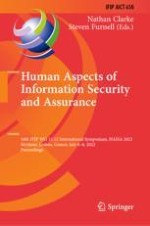2022 | OriginalPaper | Chapter
Online Security Attack Experience and Worries of Young Adults in the United Kingdom
Authors : Najla Aldaraani, Helen Petrie, Siamak F. Shahandashti
Published in: Human Aspects of Information Security and Assurance
Publisher: Springer International Publishing
Activate our intelligent search to find suitable subject content or patents.
Select sections of text to find matching patents with Artificial Intelligence. powered by
Select sections of text to find additional relevant content using AI-assisted search. powered by
